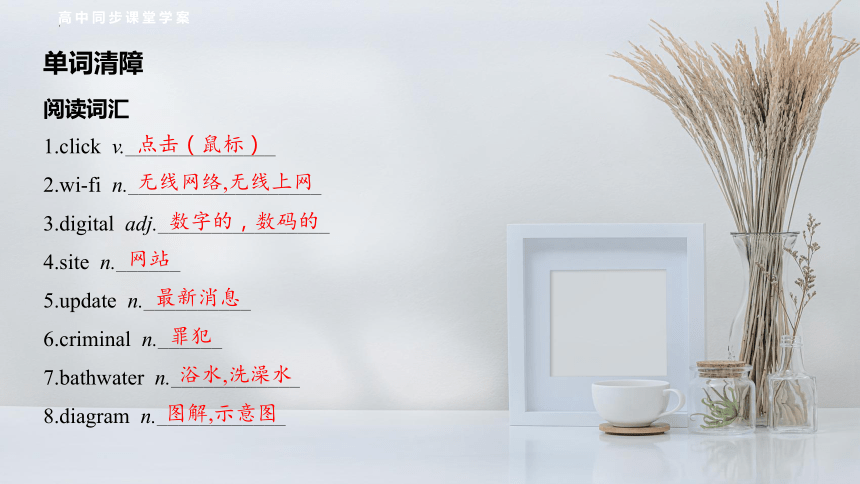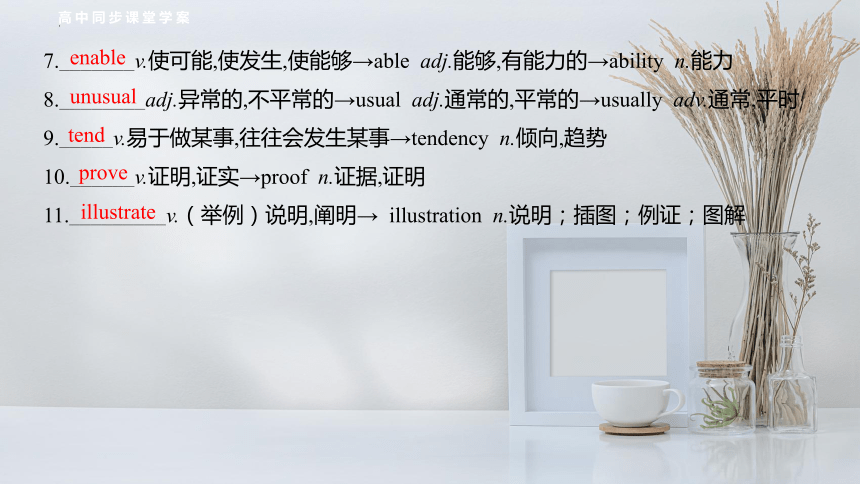外研版(2019)必修第一册Unit 4 Friends Forever Starting out & Understanding ideas 课件(共52张PPT)
文档属性
| 名称 | 外研版(2019)必修第一册Unit 4 Friends Forever Starting out & Understanding ideas 课件(共52张PPT) |  | |
| 格式 | pptx | ||
| 文件大小 | 1.3MB | ||
| 资源类型 | 教案 | ||
| 版本资源 | 外研版(2019) | ||
| 科目 | 英语 | ||
| 更新时间 | 2024-07-30 20:02:58 | ||
图片预览












文档简介
(共52张PPT)
Unit 4 Friends forever
Starting out & Understanding ideas
单词清障
阅读词汇
1.click v.______________
2.wi-fi n.__________________
3.digital adj.________________
4.site n.______
5.update n.__________
6.criminal n.______
7.bathwater n.____________
8.diagram n.____________
点击(鼠标)
无线网络,无线上网
数字的,数码的
网站
最新消息
罪犯
浴水,洗澡水
图解,示意图
写作词汇
1._______adv.永远,永恒地
2._________v.保持,维持
3._______n.格言,谚语,警句
4.________v.获得,得到
5._______n.商品
forever
maintain
saying
acquire
goods
拓展词汇
1.________adj.熟悉的→unfamiliar adj.不熟悉的
2.__________n.历险(经历),奇遇,冒险→adventurous adj.有冒险精神的
3.______v.更喜欢→preference n.喜爱,偏爱
4._______v.递送,传送→delivery n.递送,传送
5.________n.进步,进展→advanced adj.先进的,高级的
6.____________adv.重大地,显著地→significant adj.意义重大的,显著的→significance
n.重要性,意义
familiar
adventure
prefer
deliver
advance
significantly
7._______v.使可能,使发生,使能够→able adj.能够,有能力的→ability n.能力
8.________adj.异常的,不平常的→usual adj.通常的,平常的→usually adv.通常,平时
9._____v.易于做某事,往往会发生某事→tendency n.倾向,趋势
10.______v.证明,证实→proof n.证据,证明
11._________v.(举例)说明,阐明→ illustration n.说明;插图;例证;图解
enable
unusual
tend
prove
illustrate
短语筑基
1. 归功于……,多亏……_________
thanks to
2. 与……交流/沟通_________________
communicate with
3. 周游世界______________________
move around the world
4. 与……保持联系_________________
stay in touch with
5. 倾向做……,易于做……_______________
tend to do sth.
6. prefer to do__________
更喜欢做
7. lose track of______________________________________
不了解……的情况/动态;与……失去联系
8. be up to_________________
忙于,从事,取决于
9. connect...with...______________________
把……和……联系起来
10. keep...in mind__________________
记住……,牢记……
11. long for__________________
渴望……,向往……
Ⅳ.句型初探
1 句型公式:What if... 如果……将会怎样?
教材原句:What if the only way of getting news from faraway friends was
writing letters that took ages to be delivered
句式仿写:如果她拒绝我的邀请将会怎么样呢?
________________________________
What if she refuses my invitation
2 句型公式:Whatever引导让步状语从句
教材原句:Whatever our hobbies, the Internet can connect us with others who
also enjoy doing them, even if they live on the other side of the world.
句式仿写:无论结果如何,杰克都会勇往直前,永不放弃。
__________________________________________________________
Whatever the result, Jack will move forward and never give up.
3 句型公式:What引导主语从句
教材原句:But we need to keep in mind that what we see on social media is
often not the whole truth about a person.
句式仿写:众所周知,老师在课堂上讲的东西对我们的学习是非常重要的。
_______________________________________________________________________
As we all know, what the teachers say in class is very important to our study.
文本精读
Ⅰ.文本理解
Reading for the main idea
What is the main idea of the text
_______________________________________________________________________
________________________________________________
The text is mainly about changes of the way of making friends and the advantages and disadvantages of making friends online.
Reading for the structure
Fill in the following blanks with proper words.
CLICK FOR A FRIEND
Ways of making friends ·Past:People lost track of their friends after
1.______________________.
The only way to stay in touch was 2._____________.
·Present: It's easy to 3.___________________ with social media tools.
Online, people can easily make new friends with those who
4.__________________.
Is online friendship real or not? It can be real if people 5.________________________________ online.
It might not be real because people tend to post
6.____________________.
moving to a new town
writing letters
maintain friendships
share their interests
exchange true personal information
only positive updates
Reading for the details
Choose the best answer according to the text.
1. The title“CLICK FOR A FRIEND?” means “___”
B
A. Is it necessary to find a friend online
B. Is it possible to find a real friend online
C. Is it easy to find a real friend online
D. Is it more popular to find a friend online now than before
2. What is the author's attitude towards online friendship ( )
D
A. Negative. B. Positive. C. Doubtful. D. Cautious.
3. What does the sentence “on the Internet, nobody knows you're a dog”
mean ( )
A
A. You don't exactly know who the person on the Internet is.
B. You may communicate with a dog on the Internet.
C. You can pretend to be a dog on the Internet.
D. You may have a chance to be a lucky dog on the Internet.
4. What does the sentence “this doesn't mean that we should throw the baby out
with the bathwater” mean ( )
D
A. We should choose to give up either the baby or the bathwater.
B. Be careful when the baby is taking a bath.
C. It's time for a baby to take a bath.
D. We shouldn't try to get rid of online friendships just because there are risks to us.
Ⅲ.课文回顾
Thanks 1.___advances in technology, the way we make friends and
communicate with them has changed 2.____________ (significant). At present,
we can travel around the world and still stay in touch 3._____our friends. It has
become much 4.______(easy) to know what our friends are doing at the same
time through social media.
The digital age and the Internet also enable us 5._______(find) and
connect with people who share the same interests, 6._________ our hobbies are
and however far they live.
to
significantly
with
easier
to find
whatever
People you know well online are not always your true friends. We need to
keep in mind that what 7._________(show) on social media is often not the
whole 8._____(true) about a person. The reason is that people tend 9._______
(put) the best of them online while hiding their ugly aspects.
Despite this, we should not give up eating for choking. Everything has two
sides. Technology has changed our way of making friends,10.____ the meaning of
friendship and the longing for friends remain the same.
is shown
truth
to put
but
Reading for thinking
1. What changes have advances in technology brought to you
_______________________________________________________________________
_______________________________________
Advances in technology have changed the way we make friends. What's more, we can shop online without going to stores.
2. Do you prefer to make friends online Why
_______________________________________________________________________
_________________________________________________________
I prefer to make friends online,because I can meet many people who have the same interests as me and communicate with them conveniently.
Ⅱ.难句突破
1. Thanks to advances in technology, how we make friends and communicate with
them has changed significantly.
【译文】得益于技术的进步,我们结交朋友、与朋友沟通的方式已经有了明显的改变。
【分析】本句是一个主从复合句。Thanks to advances in technology是____语,how
we make...with them是____语。
状
主
2. Whatever our hobbies, the Internet can connect us with others who also enjoy
doing them, even if they live on the other side of the world.
【译文】不管我们的爱好是什么,我们都能在网上结识同好,哪怕他们住在世界的另
一端。
【分析】本句为主从复合句。主句是the Internet can connect us with
others;Whatever our hobbies是__________从句;who also enjoy doing them是
______从句,修饰先行词others;even if 引导__________从句。
让步状语
定语
让步状语
3. Although technology has changed the way we acquire friends, the meaning of
friendship and our longing for friends remain the same.
【译文】虽然科技改变了我们交朋友的方式,但友谊的意义和我们对朋友的渴望依
然没有变。
【分析】这是一个主从复合句。Although引导的是__________从句,其中we acquire
friends是______从句,修饰先行词the way。主句部分的谓语动词是系动词_______.
让步状语
定语
remain
词句精讲
1 familiar adj.熟悉的
情境佳句
①It's easy to learn a country's culture if one is familiar with its language and customs.如果一个人熟悉一个国家的语言和风俗习惯,学习这个国家的文化是很容易的。
②The basketball superstar Kobe Bryant is familiar to people all over the world.
篮球巨星科比·布莱恩特为世人所熟知。
③She grew many wonderful plants that were unfamiliar to me.她种了很多我不熟悉的奇妙植物。
归纳拓展
(1)sb. get/be familiar with...某人熟悉/通晓……
sth. be familiar to sb.某物为某人所熟悉
(2)unfamiliar adj.陌生的;不熟悉的;不认识的
学以致用
[单句填空/一句多译]
① The course is designed for students who are familiar _____ computers.
with
② The smell is very familiar ___ anyone who lives in the mountain village.
to
③ 她总是热心助人,所以这个社区的每个人都熟悉她。
→She is always willing to help others, so everyone in the community
__________________.
→She is always willing to help others, so she
_____________________________________.
is familiar with her
is familiar to everyone in the community
2 prefer v.更喜欢
情境佳句
①How do you prefer to communicate with friends every day (教材原句)
你更喜欢每天和朋友怎样交流
②At weekends, I prefer reading books to playing online games at home.
在周末,与在家玩网络游戏相比,我更喜欢看书。
③He is interested in all subjects, but he has a particular preference for English.
他对所有科目都感兴趣,但是对英语尤其偏爱。
归纳拓展
(1)prefer (sb.) to do sth. 宁愿/更喜欢(某人)做某事
prefer(doing)sth. to(doing)sth.与……相比更喜欢……
(2)preference n.偏爱,优先权
have a preference for偏爱
名师点津
(1)prefer意为“更喜欢”, 相当于like better, 所以prefer不与比较级连用;
(2)prefer的过去式、过去分词均为preferred, 现在分词为preferring。
学以致用
[单句填空/一句多译]
① The girl has a preference ____ music and she hopes to be a singer.
for
② In the crowded city, my father prefers walking to _______(take)a bus.
taking
③ When it comes to making friends, we prefer __________(choose) those who
are kind and honest.
to choose
④ 她宁愿给孩子们做玩具也不愿给他们买玩具。
→_________________________________________________________.
→______________________________________________________.
→______________________________________________________.
She prefers to make toys for her children rather than buy them
She would rather make toys for her children than buy them
She would make toys for her children rather than buy them
3 deliver v.递送,传送,发表演讲
情境佳句
①Did you deliver my message to my mother?
你把我的信息传送给我母亲了吗?
②Last summer vacation, he did a part-time job to deliver milk in town.
去年暑假,他在城里做了一份送牛奶的兼职工作。
③Our Chinese teacher, Ms. Chen, will deliver a speech on writing online this afternoon.今天下午,我们的语文老师陈老师将在网上发表关于写作的演讲。
归纳拓展
(1)deliver sth.递送某物
deliver sth. to sb.把某物递送给某人
deliver a speech发表演说
deliver a baby接生孩子
(2)delivery n.递送,传送
学以致用
[赏句猜义/单句填空]
① Would you like to have the fresh milk delivered to your door ______
递送
② The king delivered a televised speech to the nation on Nov. 5.______
发表
③ They rushed her to hospital where doctors delivered her baby. ______
接生
④ We offer customers a free home________(deliver) service.
delivery
4 advance n.进步,进展;前进,行进 v.发展,进步;(使)向前移动;提前
情境佳句
①Thanks to advances in technology, how we make friends and communicate with them has changed significantly.(教材原句)
得益于技术的进步,我们结交朋友、与朋友沟通的方式已经有了明显的改变。
②If there is any change about the time of the meeting, please inform us in advance.
开会时间如有变动,请提前通知我们。
③Today we have too many choices of communication through advanced technology.
今天,通过先进的技术,我们有太多的沟通选择。
归纳拓展
(1)in advance=ahead of time提前
in advance of在……之前
make an advance/advances in在某方面取得进步
(2)advanced adj.高级的;先进的
advanced technology高科技
学以致用
[单句填空/完成句子]
① In the near future, more _________(advance) in the robot technology will
be made by scientists.
advances
② To catch the early train, we ordered a taxi ___ advance and got up early.
in
③ 由于先进的技术,我们生活在一个更好的通信时代。
_____________________________, we live in an age of better communication.
Thanks to advanced technology
④ 近年来,中国医生在治疗癌症方面取得了很大进展。
Chinese doctors ___________________________ treating cancer these years.
have made great advances in
5 lose track of 不了解……的情况/动态;与……失去联系
情境佳句
①How would you feel if moving to a new town meant losing track of your friends (教材原句)
如果搬到一个新的城镇意味着与朋友失去联系,你会作何感受?
②It's hard to keep track of all one's old school friends.
与所有老校友都保持联系是很困难的。
③I tried to get my life back on track after several failures.
几次失败之后,我努力使我的生活恢复正常。
归纳拓展
keep track of与……保持联系;了解……的动态
back on track重新步入正确轨道;恢复正常
be on the track of sb./sth. 追踪/追寻某人或某物
头脑风暴
表示“与……失去联系”的短语还有:
lose contact/touch with sb.(表示动作);be out of contact/touch with sb.(表示状态)
学以致用
[完成句子]
① 我们在纽约定居后,我就和我最好的朋友失去了联系。
I __________________________after we settled in New York.
lost track of my best friend
② 我认为这是记录我们开支的有效方法。
I think this is an effective way of ________________ our spending.
keeping track of
③ 警察正在追踪那个小偷。
The police are _______________ the thief.
on the track of
6 up to 正在干,从事;胜任;达到(数量、程度等);直到
情境佳句
①Social media tools let us see what our friends are up to and maintain friendships.(教材原句)社交媒体工具让我们能知晓朋友的动向、维系彼此间的友谊。
②Tom is talented, so I think he is up to the job.
汤姆很有才能,所以我认为他能胜任这份工作。
③It's up to you to decide to eat out or at home.
由你决定是到外面吃还是在家里吃。
归纳拓展
be up to(doing) sth.能胜任(做)某事
be up to sb.(to do sth.)由某人决定(做某事)
up to+数量 多达……
up to+时间 直到……
up to now到目前为止(与现在完成时连用)
学以致用
[单句填空/完成句子]
① Up to now, we ____________(learn) more than two thousand of English
words.
have learned
② 由经理来做最后的决定。
_____________________ to make the final decision.
It's up to the manager
③ 孩子们很安静;我想知道他们在做什么。
The children are very quiet; I wonder what ______________.
they are up to
④ 生病之后,他不能胜任做这项工作了。
After the illness, he was no longer ____________ the job.
up to doing
7 tend to do 易于做……,倾向于做……
情境佳句
①After doing housework, children tend to be more helpful and more care for the other family members.
做完家务后,孩子往往更乐于助人,更关心其他家庭成员。
②Sophia was in the bedroom tending (to) her son.
索菲娅在卧室里照料她的儿子。
③There is a growing tendency for people to work at homes instead of in offices.人们在家里工作而不是在办公室工作正成为增长的趋势。
归纳拓展
(1)tend (to) sb.照料/护理某人
(2)tendency n.倾向,趋势;偏好;性情
have a tendency to do sth.喜欢做某事;倾向于做某事
学以致用
[单句填空]
① Students tend _______(turn) to the dictionary if they meet new words when
reading.
to turn
② There seems to be a growing_________ (tend) for young people to go
against their parents' wish.
tendency
③ Most parents have a tendency ________(offer) their children whatever they
want.
to offer
8 What if... 如果……将会怎样?
情境佳句
①What if he gets angry I'm a little worried.
倘若他生气该怎么办?我有点儿担心。
②What/How about going to the cinema tonight A new film is on show.
今天晚上去看电影怎么样?有一部新电影正在上映。
③If she spent five years in Paris, how come her French is so bad
既然她在巴黎待了五年,她的法语怎么还会这样糟糕?
归纳拓展
(1)What if... 后跟完整的句子,用于提出假设,尤其用于询问不希望看到的事发生时的结果。
(2)What/How about... ……怎么样?(表示建议)
(3)How come 用于口语交际中,表示疑惑,意为“为什么会这样呢/怎么搞的?”How come还可以接句子,其后的句子用陈述句语序。
(4)So what 那又怎样?那又如何?
学以致用
[完成句子]
① 如果我们的老师知道发生了什么会怎么样
________________________ what had happened
What if our teacher knew
② 这个周末去养老院帮助老人怎么样
________________________ the nursing home to help the elderly this weekend
How/What about going to
③ ——她会为你所做的事情生气的。——那又怎样?我不在乎。
—She will be angry at what you have done.
—_________ I don't care.
So what
9 whatever引导让步状语从句
情境佳句
①Whatever I do in the future(No matter what I do in the future), I will try my best to achieve my goals.
无论我将来做什么,我都会尽我最大的努力去实现我的目标。
②Whatever your interest, you must concentrate on your study from now on.
不管你的兴趣是什么,从现在起你必须专心学习。
③I eat whatever I want but I still don't seem to put on weight.我想吃什么就吃什么,但我似乎仍没增重。
归纳拓展
(1)whatever引导让步状语从句,相当于no matter what。有类似用法的词还有wherever,however等。
(2)whatever还可以引导名词性从句。
学以致用
[完成句子]
① 无论明天天气如何,来自全国各地的志愿者都将前往灾区。
_________________________________________________, volunteers from across
the country will head toward the disaster area.
Whatever/No matter what the weather is like tomorrow
② 无论发生什么事,你知道我会在你身边支持你。
_______________________________, you know I will be there to support you.
Whatever/No matter what happens
③ 在幼儿园里,孩子们被允许做任何他们喜欢的事情。
In the kindergarten, children are allowed to do _________________.
whatever they like
10 keep/bear in mind+that从句
情境佳句
①But we need to keep in mind that what we see on social media is often not the whole truth about a person. (教材原句)但我们需要谨记,我们在社交媒体上看到的,往往不是一个人的全部真面目。
②What's the first word that comes to mind when you see the picture above
看到上面的图片,你想到的第一个单词是什么?
③You must always keep the readers in mind when writing a report.写报告时,你一定要把读者时刻记在心里。
归纳拓展
bear/keep(...)in mind 记住
bring...to one's mind使想起;记起
come to mind突然想起
change one's mind 改变主意
make up one's mind 打定主意;下定决心
学以致用
[完成句子]
① 你应该记住你的父母最爱你。
You should_________________ your parents love you most.
keep in mind that
② 这幅画使我想起了在农场和农民们在一起的那些日子。
The picture ________ those days on the farm with the farmers ____________.
brought
to my mind
③ 在我的父母和老师的鼓励下,我下定决心要努力学习。
Encouraged by my parents and teachers, ________________________________.
I made up my mind to study hard
Thanks
Unit 4 Friends forever
Starting out & Understanding ideas
单词清障
阅读词汇
1.click v.______________
2.wi-fi n.__________________
3.digital adj.________________
4.site n.______
5.update n.__________
6.criminal n.______
7.bathwater n.____________
8.diagram n.____________
点击(鼠标)
无线网络,无线上网
数字的,数码的
网站
最新消息
罪犯
浴水,洗澡水
图解,示意图
写作词汇
1._______adv.永远,永恒地
2._________v.保持,维持
3._______n.格言,谚语,警句
4.________v.获得,得到
5._______n.商品
forever
maintain
saying
acquire
goods
拓展词汇
1.________adj.熟悉的→unfamiliar adj.不熟悉的
2.__________n.历险(经历),奇遇,冒险→adventurous adj.有冒险精神的
3.______v.更喜欢→preference n.喜爱,偏爱
4._______v.递送,传送→delivery n.递送,传送
5.________n.进步,进展→advanced adj.先进的,高级的
6.____________adv.重大地,显著地→significant adj.意义重大的,显著的→significance
n.重要性,意义
familiar
adventure
prefer
deliver
advance
significantly
7._______v.使可能,使发生,使能够→able adj.能够,有能力的→ability n.能力
8.________adj.异常的,不平常的→usual adj.通常的,平常的→usually adv.通常,平时
9._____v.易于做某事,往往会发生某事→tendency n.倾向,趋势
10.______v.证明,证实→proof n.证据,证明
11._________v.(举例)说明,阐明→ illustration n.说明;插图;例证;图解
enable
unusual
tend
prove
illustrate
短语筑基
1. 归功于……,多亏……_________
thanks to
2. 与……交流/沟通_________________
communicate with
3. 周游世界______________________
move around the world
4. 与……保持联系_________________
stay in touch with
5. 倾向做……,易于做……_______________
tend to do sth.
6. prefer to do__________
更喜欢做
7. lose track of______________________________________
不了解……的情况/动态;与……失去联系
8. be up to_________________
忙于,从事,取决于
9. connect...with...______________________
把……和……联系起来
10. keep...in mind__________________
记住……,牢记……
11. long for__________________
渴望……,向往……
Ⅳ.句型初探
1 句型公式:What if... 如果……将会怎样?
教材原句:What if the only way of getting news from faraway friends was
writing letters that took ages to be delivered
句式仿写:如果她拒绝我的邀请将会怎么样呢?
________________________________
What if she refuses my invitation
2 句型公式:Whatever引导让步状语从句
教材原句:Whatever our hobbies, the Internet can connect us with others who
also enjoy doing them, even if they live on the other side of the world.
句式仿写:无论结果如何,杰克都会勇往直前,永不放弃。
__________________________________________________________
Whatever the result, Jack will move forward and never give up.
3 句型公式:What引导主语从句
教材原句:But we need to keep in mind that what we see on social media is
often not the whole truth about a person.
句式仿写:众所周知,老师在课堂上讲的东西对我们的学习是非常重要的。
_______________________________________________________________________
As we all know, what the teachers say in class is very important to our study.
文本精读
Ⅰ.文本理解
Reading for the main idea
What is the main idea of the text
_______________________________________________________________________
________________________________________________
The text is mainly about changes of the way of making friends and the advantages and disadvantages of making friends online.
Reading for the structure
Fill in the following blanks with proper words.
CLICK FOR A FRIEND
Ways of making friends ·Past:People lost track of their friends after
1.______________________.
The only way to stay in touch was 2._____________.
·Present: It's easy to 3.___________________ with social media tools.
Online, people can easily make new friends with those who
4.__________________.
Is online friendship real or not? It can be real if people 5.________________________________ online.
It might not be real because people tend to post
6.____________________.
moving to a new town
writing letters
maintain friendships
share their interests
exchange true personal information
only positive updates
Reading for the details
Choose the best answer according to the text.
1. The title“CLICK FOR A FRIEND?” means “___”
B
A. Is it necessary to find a friend online
B. Is it possible to find a real friend online
C. Is it easy to find a real friend online
D. Is it more popular to find a friend online now than before
2. What is the author's attitude towards online friendship ( )
D
A. Negative. B. Positive. C. Doubtful. D. Cautious.
3. What does the sentence “on the Internet, nobody knows you're a dog”
mean ( )
A
A. You don't exactly know who the person on the Internet is.
B. You may communicate with a dog on the Internet.
C. You can pretend to be a dog on the Internet.
D. You may have a chance to be a lucky dog on the Internet.
4. What does the sentence “this doesn't mean that we should throw the baby out
with the bathwater” mean ( )
D
A. We should choose to give up either the baby or the bathwater.
B. Be careful when the baby is taking a bath.
C. It's time for a baby to take a bath.
D. We shouldn't try to get rid of online friendships just because there are risks to us.
Ⅲ.课文回顾
Thanks 1.___advances in technology, the way we make friends and
communicate with them has changed 2.____________ (significant). At present,
we can travel around the world and still stay in touch 3._____our friends. It has
become much 4.______(easy) to know what our friends are doing at the same
time through social media.
The digital age and the Internet also enable us 5._______(find) and
connect with people who share the same interests, 6._________ our hobbies are
and however far they live.
to
significantly
with
easier
to find
whatever
People you know well online are not always your true friends. We need to
keep in mind that what 7._________(show) on social media is often not the
whole 8._____(true) about a person. The reason is that people tend 9._______
(put) the best of them online while hiding their ugly aspects.
Despite this, we should not give up eating for choking. Everything has two
sides. Technology has changed our way of making friends,10.____ the meaning of
friendship and the longing for friends remain the same.
is shown
truth
to put
but
Reading for thinking
1. What changes have advances in technology brought to you
_______________________________________________________________________
_______________________________________
Advances in technology have changed the way we make friends. What's more, we can shop online without going to stores.
2. Do you prefer to make friends online Why
_______________________________________________________________________
_________________________________________________________
I prefer to make friends online,because I can meet many people who have the same interests as me and communicate with them conveniently.
Ⅱ.难句突破
1. Thanks to advances in technology, how we make friends and communicate with
them has changed significantly.
【译文】得益于技术的进步,我们结交朋友、与朋友沟通的方式已经有了明显的改变。
【分析】本句是一个主从复合句。Thanks to advances in technology是____语,how
we make...with them是____语。
状
主
2. Whatever our hobbies, the Internet can connect us with others who also enjoy
doing them, even if they live on the other side of the world.
【译文】不管我们的爱好是什么,我们都能在网上结识同好,哪怕他们住在世界的另
一端。
【分析】本句为主从复合句。主句是the Internet can connect us with
others;Whatever our hobbies是__________从句;who also enjoy doing them是
______从句,修饰先行词others;even if 引导__________从句。
让步状语
定语
让步状语
3. Although technology has changed the way we acquire friends, the meaning of
friendship and our longing for friends remain the same.
【译文】虽然科技改变了我们交朋友的方式,但友谊的意义和我们对朋友的渴望依
然没有变。
【分析】这是一个主从复合句。Although引导的是__________从句,其中we acquire
friends是______从句,修饰先行词the way。主句部分的谓语动词是系动词_______.
让步状语
定语
remain
词句精讲
1 familiar adj.熟悉的
情境佳句
①It's easy to learn a country's culture if one is familiar with its language and customs.如果一个人熟悉一个国家的语言和风俗习惯,学习这个国家的文化是很容易的。
②The basketball superstar Kobe Bryant is familiar to people all over the world.
篮球巨星科比·布莱恩特为世人所熟知。
③She grew many wonderful plants that were unfamiliar to me.她种了很多我不熟悉的奇妙植物。
归纳拓展
(1)sb. get/be familiar with...某人熟悉/通晓……
sth. be familiar to sb.某物为某人所熟悉
(2)unfamiliar adj.陌生的;不熟悉的;不认识的
学以致用
[单句填空/一句多译]
① The course is designed for students who are familiar _____ computers.
with
② The smell is very familiar ___ anyone who lives in the mountain village.
to
③ 她总是热心助人,所以这个社区的每个人都熟悉她。
→She is always willing to help others, so everyone in the community
__________________.
→She is always willing to help others, so she
_____________________________________.
is familiar with her
is familiar to everyone in the community
2 prefer v.更喜欢
情境佳句
①How do you prefer to communicate with friends every day (教材原句)
你更喜欢每天和朋友怎样交流
②At weekends, I prefer reading books to playing online games at home.
在周末,与在家玩网络游戏相比,我更喜欢看书。
③He is interested in all subjects, but he has a particular preference for English.
他对所有科目都感兴趣,但是对英语尤其偏爱。
归纳拓展
(1)prefer (sb.) to do sth. 宁愿/更喜欢(某人)做某事
prefer(doing)sth. to(doing)sth.与……相比更喜欢……
(2)preference n.偏爱,优先权
have a preference for偏爱
名师点津
(1)prefer意为“更喜欢”, 相当于like better, 所以prefer不与比较级连用;
(2)prefer的过去式、过去分词均为preferred, 现在分词为preferring。
学以致用
[单句填空/一句多译]
① The girl has a preference ____ music and she hopes to be a singer.
for
② In the crowded city, my father prefers walking to _______(take)a bus.
taking
③ When it comes to making friends, we prefer __________(choose) those who
are kind and honest.
to choose
④ 她宁愿给孩子们做玩具也不愿给他们买玩具。
→_________________________________________________________.
→______________________________________________________.
→______________________________________________________.
She prefers to make toys for her children rather than buy them
She would rather make toys for her children than buy them
She would make toys for her children rather than buy them
3 deliver v.递送,传送,发表演讲
情境佳句
①Did you deliver my message to my mother?
你把我的信息传送给我母亲了吗?
②Last summer vacation, he did a part-time job to deliver milk in town.
去年暑假,他在城里做了一份送牛奶的兼职工作。
③Our Chinese teacher, Ms. Chen, will deliver a speech on writing online this afternoon.今天下午,我们的语文老师陈老师将在网上发表关于写作的演讲。
归纳拓展
(1)deliver sth.递送某物
deliver sth. to sb.把某物递送给某人
deliver a speech发表演说
deliver a baby接生孩子
(2)delivery n.递送,传送
学以致用
[赏句猜义/单句填空]
① Would you like to have the fresh milk delivered to your door ______
递送
② The king delivered a televised speech to the nation on Nov. 5.______
发表
③ They rushed her to hospital where doctors delivered her baby. ______
接生
④ We offer customers a free home________(deliver) service.
delivery
4 advance n.进步,进展;前进,行进 v.发展,进步;(使)向前移动;提前
情境佳句
①Thanks to advances in technology, how we make friends and communicate with them has changed significantly.(教材原句)
得益于技术的进步,我们结交朋友、与朋友沟通的方式已经有了明显的改变。
②If there is any change about the time of the meeting, please inform us in advance.
开会时间如有变动,请提前通知我们。
③Today we have too many choices of communication through advanced technology.
今天,通过先进的技术,我们有太多的沟通选择。
归纳拓展
(1)in advance=ahead of time提前
in advance of在……之前
make an advance/advances in在某方面取得进步
(2)advanced adj.高级的;先进的
advanced technology高科技
学以致用
[单句填空/完成句子]
① In the near future, more _________(advance) in the robot technology will
be made by scientists.
advances
② To catch the early train, we ordered a taxi ___ advance and got up early.
in
③ 由于先进的技术,我们生活在一个更好的通信时代。
_____________________________, we live in an age of better communication.
Thanks to advanced technology
④ 近年来,中国医生在治疗癌症方面取得了很大进展。
Chinese doctors ___________________________ treating cancer these years.
have made great advances in
5 lose track of 不了解……的情况/动态;与……失去联系
情境佳句
①How would you feel if moving to a new town meant losing track of your friends (教材原句)
如果搬到一个新的城镇意味着与朋友失去联系,你会作何感受?
②It's hard to keep track of all one's old school friends.
与所有老校友都保持联系是很困难的。
③I tried to get my life back on track after several failures.
几次失败之后,我努力使我的生活恢复正常。
归纳拓展
keep track of与……保持联系;了解……的动态
back on track重新步入正确轨道;恢复正常
be on the track of sb./sth. 追踪/追寻某人或某物
头脑风暴
表示“与……失去联系”的短语还有:
lose contact/touch with sb.(表示动作);be out of contact/touch with sb.(表示状态)
学以致用
[完成句子]
① 我们在纽约定居后,我就和我最好的朋友失去了联系。
I __________________________after we settled in New York.
lost track of my best friend
② 我认为这是记录我们开支的有效方法。
I think this is an effective way of ________________ our spending.
keeping track of
③ 警察正在追踪那个小偷。
The police are _______________ the thief.
on the track of
6 up to 正在干,从事;胜任;达到(数量、程度等);直到
情境佳句
①Social media tools let us see what our friends are up to and maintain friendships.(教材原句)社交媒体工具让我们能知晓朋友的动向、维系彼此间的友谊。
②Tom is talented, so I think he is up to the job.
汤姆很有才能,所以我认为他能胜任这份工作。
③It's up to you to decide to eat out or at home.
由你决定是到外面吃还是在家里吃。
归纳拓展
be up to(doing) sth.能胜任(做)某事
be up to sb.(to do sth.)由某人决定(做某事)
up to+数量 多达……
up to+时间 直到……
up to now到目前为止(与现在完成时连用)
学以致用
[单句填空/完成句子]
① Up to now, we ____________(learn) more than two thousand of English
words.
have learned
② 由经理来做最后的决定。
_____________________ to make the final decision.
It's up to the manager
③ 孩子们很安静;我想知道他们在做什么。
The children are very quiet; I wonder what ______________.
they are up to
④ 生病之后,他不能胜任做这项工作了。
After the illness, he was no longer ____________ the job.
up to doing
7 tend to do 易于做……,倾向于做……
情境佳句
①After doing housework, children tend to be more helpful and more care for the other family members.
做完家务后,孩子往往更乐于助人,更关心其他家庭成员。
②Sophia was in the bedroom tending (to) her son.
索菲娅在卧室里照料她的儿子。
③There is a growing tendency for people to work at homes instead of in offices.人们在家里工作而不是在办公室工作正成为增长的趋势。
归纳拓展
(1)tend (to) sb.照料/护理某人
(2)tendency n.倾向,趋势;偏好;性情
have a tendency to do sth.喜欢做某事;倾向于做某事
学以致用
[单句填空]
① Students tend _______(turn) to the dictionary if they meet new words when
reading.
to turn
② There seems to be a growing_________ (tend) for young people to go
against their parents' wish.
tendency
③ Most parents have a tendency ________(offer) their children whatever they
want.
to offer
8 What if... 如果……将会怎样?
情境佳句
①What if he gets angry I'm a little worried.
倘若他生气该怎么办?我有点儿担心。
②What/How about going to the cinema tonight A new film is on show.
今天晚上去看电影怎么样?有一部新电影正在上映。
③If she spent five years in Paris, how come her French is so bad
既然她在巴黎待了五年,她的法语怎么还会这样糟糕?
归纳拓展
(1)What if... 后跟完整的句子,用于提出假设,尤其用于询问不希望看到的事发生时的结果。
(2)What/How about... ……怎么样?(表示建议)
(3)How come 用于口语交际中,表示疑惑,意为“为什么会这样呢/怎么搞的?”How come还可以接句子,其后的句子用陈述句语序。
(4)So what 那又怎样?那又如何?
学以致用
[完成句子]
① 如果我们的老师知道发生了什么会怎么样
________________________ what had happened
What if our teacher knew
② 这个周末去养老院帮助老人怎么样
________________________ the nursing home to help the elderly this weekend
How/What about going to
③ ——她会为你所做的事情生气的。——那又怎样?我不在乎。
—She will be angry at what you have done.
—_________ I don't care.
So what
9 whatever引导让步状语从句
情境佳句
①Whatever I do in the future(No matter what I do in the future), I will try my best to achieve my goals.
无论我将来做什么,我都会尽我最大的努力去实现我的目标。
②Whatever your interest, you must concentrate on your study from now on.
不管你的兴趣是什么,从现在起你必须专心学习。
③I eat whatever I want but I still don't seem to put on weight.我想吃什么就吃什么,但我似乎仍没增重。
归纳拓展
(1)whatever引导让步状语从句,相当于no matter what。有类似用法的词还有wherever,however等。
(2)whatever还可以引导名词性从句。
学以致用
[完成句子]
① 无论明天天气如何,来自全国各地的志愿者都将前往灾区。
_________________________________________________, volunteers from across
the country will head toward the disaster area.
Whatever/No matter what the weather is like tomorrow
② 无论发生什么事,你知道我会在你身边支持你。
_______________________________, you know I will be there to support you.
Whatever/No matter what happens
③ 在幼儿园里,孩子们被允许做任何他们喜欢的事情。
In the kindergarten, children are allowed to do _________________.
whatever they like
10 keep/bear in mind+that从句
情境佳句
①But we need to keep in mind that what we see on social media is often not the whole truth about a person. (教材原句)但我们需要谨记,我们在社交媒体上看到的,往往不是一个人的全部真面目。
②What's the first word that comes to mind when you see the picture above
看到上面的图片,你想到的第一个单词是什么?
③You must always keep the readers in mind when writing a report.写报告时,你一定要把读者时刻记在心里。
归纳拓展
bear/keep(...)in mind 记住
bring...to one's mind使想起;记起
come to mind突然想起
change one's mind 改变主意
make up one's mind 打定主意;下定决心
学以致用
[完成句子]
① 你应该记住你的父母最爱你。
You should_________________ your parents love you most.
keep in mind that
② 这幅画使我想起了在农场和农民们在一起的那些日子。
The picture ________ those days on the farm with the farmers ____________.
brought
to my mind
③ 在我的父母和老师的鼓励下,我下定决心要努力学习。
Encouraged by my parents and teachers, ________________________________.
I made up my mind to study hard
Thanks
